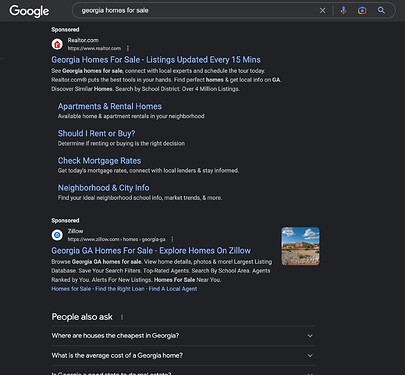“The best hiding place is the second page of Google.”
I’m paraphrasing a very apt quote from Dharmesh Shah, Founder and Chief Technology Officer of HubSpot.
This quote sprung to mind when I began reading the excellent 8th “chapter” in Brian Dean’s SEO article titled: “Combat Decreasing CTR’s” - focusing primarily on organic click-through-rates (CTRs).
And it’s something I want to start a discussion about today!
An organic CTR is the percentage of clicks your website receives when it appears on a search engine results page (SERP) without the use of paid advertising.
In the world of real estate, and SEO strategy in general(!!), organic click through rates are vital - representing the difference between a site buried on page 2 of Google, or a reputable top result with authority, consistent traffic, and a massive decrease in ad spend.
When it comes to your virtual storefront - every click counts!
In Paul Dean’s tutorial, he presents an industry study that claims organic CTRs on mobile search are down 41.4% since 2015! Dean states there is one main culprit: Google. More specifically, how Google’s SERP features are crowding out organic search results.
These SERP features included paid/sponsored ads, answer boxes, carousels, “People Also Ask”, and featured snippets. While these facts are true for other popular search engines, Google will be the primary focus.
Above, a simple Google search of “Georgia Homes for Sale” leads to 2 sponsored posts followed by a “People Also Ask” section.
Through extensive research, Dean presented 3 simple, but crucial tips to massively increase a site’s visibility and truly stand out in the SERPs.
1. Include Keyword-Rich URLs
A large-scale organic CTR study found that keyword-rich URLs received 45% more clicks than URLs that did not contain a keyword that matched a person’s search. This is a substantial finding, but once you understand how vital URL keywords are, you may not be surprised.
The keywords used in a site’s URL are as important and searchable as the title of the page itself. While it’s beneficial to use multiple keywords in a URL to boost its visibility, it is equally as important to ensure these keywords’ relevance - the only thing worse than no traffic is traffic that considers your page irrelevant.
For example if someone searched “New York Luxury Apartments for Sale” the page with the URL: “unitedstateshomesforsale.com/new-york-city-luxury-apartments-for-sale” would have a far higher CTR than another site with the URL: “unitedstateshomesforsale.com/page2/listing43671”
Similarly, I searched “Florida Homes for Sale” and the first organic page that appeared on Google contained the following URL:
2. Use Emotion (Without Going Overboard)
Dean’s research found that sites with emotional titles had “relatively high” organic CTRs across the board. However, what’s interesting about this particular find is that while emotional titles increased organic CTRs by around 10-15%, titles with “Power Words” reduced clicks by nearly the same amount.
It seems Google searchers crave compelling titles, but have become increasingly savvy to titles that sound like clickbait. This point is especially relevant when it comes to real estate, as its online content necessitates this language to produce emotional connections with potential buyers.
Examples of emotional real estate titles:
- Find the home of your dreams!
- Your happy place is waiting for you!
- Fall in love with your new home!
Examples of real estate titles with Power Words:
- Properties you won’t believe exist!
- Our listings will blow you away!
- Unleash your dream home!
3. Write Meta Descriptions for Every Page
Finally, it was found that websites with accurate, original, and compelling meta tag descriptions had a 6% increase in organic CTRs.
Meta descriptions are similar to URLs in that they provide a great opportunity to capitalize on relevant and searchable keywords. However, where they differ is that meta descriptions offer a much larger canvas to attract visitors with clear and descriptive copy that can act as an elevator pitch about the contents of the site as well as the company itself.
It’s important to keep the descriptions concise and always use relevant keywords. Another rule of thumb is not go over the word count to the point where your full meta description (150-160 characters) and page title (50-60 characters) are not fully readable on a search engine page.
Overall, I thought this section of Paul Dean’s tutorial was incredibly insightful, providing illuminating research alongside effective ways to to become a top ranked authority without the need of excessive ad spend.
But that is where my questions for the community comes in:
-
Can a website (real estate or otherwise) achieve high authority, consistent traffic, and maintain a high page ranking without relying on paid search or utilizing SERP features?
-
Are there any other tips that weren’t mentioned in this post that you’ve used to successfully boost organic CTRs?
Let me know below!

